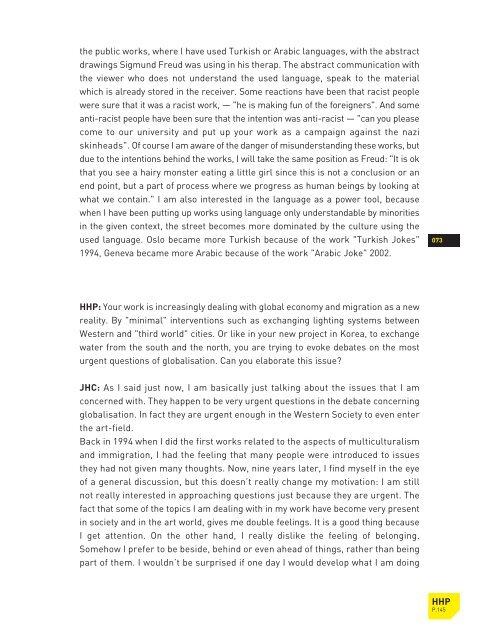download catalogue high resolution pdf (22.3 mb) - Jens Haaning
download catalogue high resolution pdf (22.3 mb) - Jens Haaning
download catalogue high resolution pdf (22.3 mb) - Jens Haaning
You also want an ePaper? Increase the reach of your titles
YUMPU automatically turns print PDFs into web optimized ePapers that Google loves.
the public works, where I have used Turkish or Arabic languages, with the abstract<br />
drawings Sigmund Freud was using in his therap. The abstract communication with<br />
the viewer who does not understand the used language, speak to the material<br />
which is already stored in the receiver. Some reactions have been that racist people<br />
were sure that it was a racist work, — "he is making fun of the foreigners". And some<br />
anti-racist people have been sure that the intention was anti-racist — "can you please<br />
come to our university and put up your work as a campaign against the nazi<br />
skinheads". Of course I am aware of the danger of misunderstanding these works, but<br />
due to the intentions behind the works, I will take the same position as Freud: "It is ok<br />
that you see a hairy monster eating a little girl since this is not a conclusion or an<br />
end point, but a part of process where we progress as human beings by looking at<br />
what we contain." I am also interested in the language as a power tool, because<br />
when I have been putting up works using language only understandable by minorities<br />
in the given context, the street becomes more dominated by the culture using the<br />
used language. Oslo became more Turkish because of the work "Turkish Jokes"<br />
1994, Geneva became more Arabic because of the work "Arabic Joke" 2002.<br />
HHP: Your work is increasingly dealing with global economy and migration as a new<br />
reality. By "minimal" interventions such as exchanging lighting systems between<br />
Western and "third world" cities. Or like in your new project in Korea, to exchange<br />
water from the south and the north, you are trying to evoke debates on the most<br />
urgent questions of globalisation. Can you elaborate this issue?<br />
JHC: As I said just now, I am basically just talking about the issues that I am<br />
concerned with. They happen to be very urgent questions in the debate concerning<br />
globalisation. In fact they are urgent enough in the Western Society to even enter<br />
the art-field.<br />
Back in 1994 when I did the first works related to the aspects of multiculturalism<br />
and immigration, I had the feeling that many people were introduced to issues<br />
they had not given many thoughts. Now, nine years later, I find myself in the eye<br />
of a general discussion, but this doesn’t really change my motivation: I am still<br />
not really interested in approaching questions just because they are urgent. The<br />
fact that some of the topics I am dealing with in my work have become very present<br />
in society and in the art world, gives me double feelings. It is a good thing because<br />
I get attention. On the other hand, I really dislike the feeling of belonging.<br />
Somehow I prefer to be beside, behind or even ahead of things, rather than being<br />
part of them. I wouldn’t be surprised if one day I would develop what I am doing<br />
073<br />
HHP<br />
P.145


